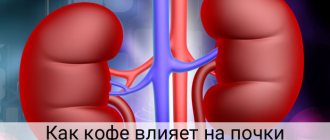Coffee is a cheerful friend in any situation. While drinking this aromatic drink, it is pleasant to scroll through websites, chat with company, and lose sleepy lethargy. It would seem that what’s scary here? Coffee is not a cigarette or alcohol, it is only a part of the diet that cannot harm the body.
But doctors around the world have different opinions about caffeine. And since almost every third inhabitant of the globe suffers from anxiety and nervousness, experts have a logical question: could everyone’s favorite coffee become an additional cause of anxiety?
coffee?
So, you've had your favorite latte or espresso. Caffeine is rapidly and completely absorbed from the gastrointestinal tract, with 99% absorbed within 45 minutes of consumption. Peak plasma concentrations occur between 15 and 120 minutes after administration. This wide variation over time may be due to changes in gastric emptying time and the presence of other dietary components, such as fiber, in the stomach. Caffeine enters the bloodstream, which goes to the brain.
The neurotransmitter adenosine accumulates in the brain during the day; when there is a large amount of it, we feel tired and want to sleep. The molecular structure of caffeine is very similar to the molecular structure of adenosine, so caffeine replaces adenosine. Accumulated fatigue subsides, we feel a surge of vigor.
By inhibiting the effects of adenosine, caffeine increases neural activity in the brain, resulting in a temporary increase in mental alertness and muscle processing. Contrary to popular belief, caffeine does not directly increase energy metabolism in the body. A cup of coffee improves physical performance by increasing duration and reaction time.
Positive effects of coffee on the nervous system
The most obvious effect of caffeine is alertness.
In large quantities, it stimulates the central nervous system, the cerebral cortex, and only later the spinal cord. The effect increases within 1 hour and lasts 3-4 hours. In fact, a little stimulation of the cortex is beneficial for clear and critical thinking. Moderate consumption activates the body's resources, stimulates the activity of neurons, so we can think faster, process information more productively, and reaction speed increases. The heart beats stronger and more often, the adrenal glands release adrenaline, a stress hormone, into the blood, which activates all other organ systems. In essence, this is artificially induced stress, in which the body is maximally mobilized, collected, and ready for any active action.
Caffeine, a nervous system stimulant, is used both recreationally and medicinally to reduce physical exhaustion and restore mental alertness when unusual weakness or drowsiness occurs. It strengthens the focal sensory system first at higher levels, providing increased acuity and alertness, faster and clearer flow of thought, enhanced concentration and better coordination of the body, and then at the level of the spinal cord.
In small doses (2-3 cups per day), caffeine can reduce symptoms of depression.
Negative effects of coffee on the nervous system
By stimulating the nervous system, coffee causes increased heart rate, increased thirst and hunger, and nervousness. Overdose sometimes results in a state of overstimulation of the central nervous system called caffeine intoxication. This condition usually occurs after ingesting large amounts of caffeine (eg, 400 to 600 mg in a single dose). Symptoms of caffeine intoxication: restlessness, agitation, insomnia, increased urination, upset stomach. Muscle twitching, irritability, and tachycardia are common. In cases of critical overdose, mania, depression, lapses in judgment, disorientation, delusions, hallucinations, or psychosis may occur.
Impact on stress and anxiety levels
What are feelings of stress and anxiety? This is a lack of emotional balance. These concepts should not be combined with depression, as they imply a completely different state of the nervous system.
The feeling of restlessness, anxiety, and fear is directly affected by the activity of brain cells. And caffeine, as you know, “invigorates”, that is, it forces the nervous system to work actively. Therefore, it can increase feelings of anxiety, as well as aggravate various neurotic disorders, such as panic attacks, obsessive-compulsive neuroses, psychoneuroses and neurasthenia.
True, the effect is very weak. It makes sense to mention it only when a person clearly abuses coffee drinks or suffers from mental disorders.
Coffee has a similar effect on stress as nicotine. That is, if anxiety is assessed in points, then a healthy person without any psychological problems has a nominal level of 100 points. This is the limit when you can completely control your anxiety.
But those who smoke have a score of 80, and for them an increase to 100 points is already a state close to stress. All this is the effect of getting used to the absence of anxiety. Coffee works the same way. And there really is an addiction to it, although it does not develop as quickly as from the same cigarettes.
What's the result? Caffeine increases anxiety and stress. But if you drink no more than 2 cups a day, then this effect is almost invisible. You can also check out our list of 7 energizing drinks to replace coffee.
use
The body adapts to everything, and that is why there are “coffeeholics” in the world who are able to drink 6-10 cups of strong coffee during the day, drink their favorite espresso or Americano an hour before bed, and at the same time get a good night’s sleep, without getting unpleasant symptoms of an overdose, feel great.
Regular consumption of caffeine can affect brain chemistry and activity. The main reason for this is that since adenosine receptors antagonize caffeine on a regular basis, the human body generates additional adenosine receptors to manage this change so that the body functions normally even with large doses of caffeine. But if you suddenly stop drinking your favorite drink, withdrawal symptoms will occur. Many people claim that without a morning cup of coffee they simply cannot think, concentrate, or wake up. If they are deprived of the usual stimulant or the dose is sharply reduced, incredible drowsiness, weakness, and yawning sets in.
Researchers recommend consuming no more than 300 mg of caffeine per day - this is a safe dose that will gently stimulate the central nervous system without causing harm.
Invigorating component and its action
The familiar body tone, the high spirits from drinking a cup of coffee - all this is caused by caffeine. By the way, there is much less of it in the instant drink. This alkaloid is also present in a number of other products: cocoa, tea, cola.
- This is interesting: Where is there more caffeine, in tea or coffee?
How does this happen
Sleep and wakefulness of the body are controlled by special receptors in the brain. A substance called adenosine makes a person sleepy. But coffee, whose molecular structure is close to adenosine, replaces this substance, preventing it from reaching those same receptors. The result is that the desire to sleep disappears. This effect of coffee lasts about 5 hours. Therefore, it is better to drink the drink no later than 6 hours before bedtime.
People's reactions to an invigorating drink are individual, but they can be summarized in the following list:
- drowsiness disappears, the brain and physical functions are activated;
- blood circulation increases, blood pressure rises, heart rate increases;
- Metabolism improves and appetite appears.
Interesting fact: in a rare category of people, the mechanism of action of coffee is completely reverse. They feel a loss of strength and drowsiness. The reason for everything is genetic characteristics. It’s just that instead of sleep receptors, caffeine blocks others – “sensors” of vigor.
Time of action
Caffeine is usually eliminated from the body within a maximum of 3 hours. But the half-life lasts on average 5 hours. At this time, sleep receptors are still blocked. The peak effect of the drink, as a rule, occurs in the first 15-45 minutes after consumption.
Conclusions:
- Coffee directly affects the nervous system, activating the activity of neurons, the brain and spinal cord.
- The effect begins within 15-45 minutes and continues for 3-4 hours.
- Among the effects, both positive (acceleration of reaction, attentiveness, activity) and negative (habit formation, hyperstimulation) are observed.
- Over time, the nervous system gets used to caffeine, and more and more doses are required to maintain stimulation.
- 300 mg of caffeine per day is an acceptable limit for a positive effect on the central nervous system, which does not harm, does not cause addiction or excessive stimulation.
The principle of action of caffeine on the nervous system
Why do some people calmly savor cup after cup, while others experience discomfort after drinking coffee?
Caffeine is a psychostimulant. Although it is not comparable in strength to pharmaceutical drugs, it has a quite powerful effect on the body, and in large doses it can even kill. Caffeine is very mobile - it begins to control brain processes within 15-20 minutes, blocking “sleepy” hormones and increasing blood pressure. The nervous system does not stand aside either - it also comes into tone and actively reacts to any irritant.
Accordingly, in nervous people, VSDs, neurotics, panickers, the central nervous system may react to coffee in an inappropriate way. And the higher the internal stress (including repressed stress that a person does not consciously feel), the higher the likelihood that coffee will awaken all the sleeping monsters inside our psyche. And while for some, increased body tone will become an assistant in business, others will suffer from anxiety and panic.
We recommend that you read: Paranoid Schizophrenia - is it possible to fight the disease?
Harm and contraindications
The harm of caffeine depends on the dosage and the condition of the body. If a person is healthy, then the substance will only have a positive effect. It will also help get rid of some problems. But if you abuse caffeine-containing products, negative consequences will not keep you waiting.
It's no secret that this substance is addictive. It stimulates the release of the hormone dopamine and suppresses fatigue. Therefore, abruptly stopping caffeine consumption can cause withdrawal symptoms.
Many people feel nervous and tired in the morning until they drink their treasured cup of coffee. This is a manifestation of the so-called “coffee mania.” To get rid of this addiction, you need to gradually reduce the dosage.
So why is caffeine harmful?
- It reduces the absorption of calcium in the body. Due to frequent consumption of caffeinated drinks, the acid-base balance in the stomach is disturbed. The degree of absorption of nutrients decreases, so the body is forced to compensate for the lack of calcium by borrowing it from the bones. Over time, this can lead to osteoporosis (brittle bones).
- Due to the strong diuretic effect, dehydration occurs.
- strong stimulation of the nervous system causes sleep disturbance and increases irritability.
- in large doses it causes surges in blood and eye pressure, which is especially dangerous for older people.
- Contraindicated for diseases of the cardiovascular system. It has a particularly depressing effect in combination with alcohol and cigarettes.
- Due to the constant stimulation of gastric secretion, problems with the gastrointestinal tract arise, and people with high acidity should not use it at all.
- Constriction of blood vessels in the brain leads to insufficient blood flow, which contributes to early aging.
- Excessive caffeine consumption by men harms their sexual health and potency. A decrease in erection occurs due to the action of plant estrogens, a small amount of which does not pose any danger.
You should be careful when consuming caffeine-containing products during pregnancy, because their effects also affect the baby. The fetus's heart rate and metabolism increase, which can negatively affect its health.
Thus, a large concentration of this substance has a depressing effect on the body. Only moderate consumption will help you avoid negative consequences and benefit.
Overdose
Large amounts of caffeine have a negative impact on physical health and can even be fatal. People with cardiovascular diseases and high blood pressure should be especially careful.
It is believed that 10 g of this substance is a lethal dose. You can get it by drinking 70 cups of coffee in a row. However, people suffering from “coffee addiction” receive about a tenth of this amount.
Symptoms of the negative effects of caffeine on the body:
- arrhythmia,
- strong increase in pressure,
- irritability,
- insomnia
- increased excitability.
The most expensive coffee in the world is made from elephant poop
0
Black Ivory coffee is the most expensive coffee in the world. A cup of this drink costs about $50. This coffee is made from beans passed through the digestive tract of an elephant. Simply put, semi-digested grains are extracted from elephant poop, washed and further processed. No need to be scared! According to reviews from those who have tried it, the drink is indeed very tasty!
You shouldn't drink coffee right after you wake up.
0
Source:
When you wake up, your body begins to produce the hormone cortisol. It gives you energy and ensures attention. Coffee interferes with the process of cortisol production. Therefore, you should drink coffee not when you wake up, but after waiting for some time - for example, when you get to work. Then a cup of drink will be extremely useful for further ensuring vigor.
How does coffee affect our mood? How to choose it and what to drink it with?
Gloomy and depressed, in a black trouser suit and black blouse, like an employee of the Bezenchuk and Sons funeral home, I looked in the mirror and realized with horror that I urgently needed to drink coffee! Later, when the coffee was drunk and my mood had noticeably improved, and a flirty silk scarf (sky blue) was tied around my neck, I thought, does coffee affect our emotional background? And if it does, how? “Still, he influences!”
“Still, coffee affects your mood!” - exclaimed American scientists who conducted “experiments” on women who were susceptible to depression. It turned out that if you drink two or three cups of coffee a day, the risk of falling into the black abyss of a disgusting mood will decrease by twenty percent. American researchers went further and finally got to the bottom of the truth - we need to take care of women, not men, because the fair half falls into depression much more often and much more difficult to get out of it. This statement contradicts the generally accepted opinion that “a woman is like a cat, and she has seven lives,” and “men are like children, they have a weak emotional background.” Nothing like this!
We all know that there are so-called “happiness hormones” that are especially necessary for women, and they can be obtained in several ways. The surest way is to fall in love, but since finding love is not an easy task, and even more so in November, we will smoothly move on to the next points. “Happiness hormones” are contained in chocolate, but chocolate is known to lead to excess weight, dental problems, and in some cases, skin problems, so eating a bar of chocolate every autumn day is overkill. It is no secret that sunlight produces the “hormone of happiness,” but sunlight and November are completely incompatible concepts in our latitudes.
The pleasure hormone, as scientists have proven, is also found in coffee (specifically caffeinated coffee), so a couple of cups of an invigorating drink in the autumn will only be beneficial. Studies have shown that women who drink 3-4 cups of coffee a day have an excellent opportunity to maintain a good mood for as long as possible. However, it is necessary to understand that such a coffee dose can lead to a heart attack or insomnia for those at risk for health reasons. Therefore, before you get hooked on the “hormone of happiness”, think carefully about whether your heart can withstand so much happiness?
How to choose it?
And if coffee is so wonderful, it lifts your spirits, clears your head, gives adrenaline, improves your well-being, then the question rightly arises, which coffee is the best? Well, to have a drink and enjoy it to the fullest.
As you know, there are a huge number of coffee varieties in the world; some, especially advanced ones, claim that there are more than two hundred of them. However, the main types of coffee are Arabica and Robusta. Arabica has a soft, rich, unobtrusive taste. Robusta contains much more caffeine than Arabica, as a result of which this coffee is more bitter and strong and invigorates so that you want to jump after it. The two main types of coffee are divided into many varieties, since the taste and aroma of coffee very much depends on the area where the coffee tree grew. Therefore, through trial and error, everyone chooses their own variety. Okay, you’ve chosen the variety, but then the hardest part begins: what kind of coffee to buy - beans, ground or instant?
True connoisseurs say that it is best to buy coffee in beans, grind it at home and brew it immediately. I don’t argue, then the aroma, taste, and strength will be the best. However, to carry out all these manipulations, you need free time, and free time is such a scarcity that we gradually move on to ground coffee.
Ground coffee is the same natural bean coffee, only already crushed to a powder state. Why it is better and worse than coffee beans is easy to understand. It’s better because you don’t need to grind it and thus you will save a lot of time, but worse because immediately after grinding the coffee begins to slowly but surely lose its aroma and taste. And sealed packaging only saves until the “first opening”, since after opening it the process of “weathering” increases tenfold.
Concerning instant coffee, true connoisseurs are silent, since, apparently, people are all well-mannered and do not want to speak out in an “uncivilized” way. However, I would like to note that sometimes a cup of instant coffee (certain varieties from certain manufacturers) comes in handy in the morning before work, in the afternoon at the office, and on a picnic in nature (in a thermos). So each of us chooses what suits him best.
What to drink it with?
They drink coffee with sugar, with sugar and cream, with sugar and milk - this is generally accepted and a little banal. Eastern traditions allow you to add a variety of spices to coffee - cinnamon, ginger, cloves, cardamom. Coffee with spices has a unique taste and aroma; of course, such a drink is strictly for everyone. Some people add nut powder or black pepper, coconut flakes or lemon to their coffee. I was very surprised when I found out that coffee with lemon is no less popular than tea with lemon and is called “romano.” They also drink coffee with ice cream, the so-called “glace.”
Lately, more and more people are drinking coffee with honey, in the “both tasty and healthy” category. Honey gives the drink additional energy and an extraordinary taste. And morning coffee with honey can not only lift your mood in November, but also protect the body from the ubiquitous autumn infections.











